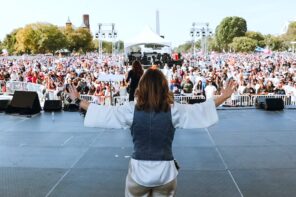The United States is suffering through an epistemic crisis. From day to day it seems increasingly difficult to know the truth with real certainty. The nation’s leadership came to power atop a wave of “fake news,” only to appropriate the term and wield it alongside its own “alternative facts.” The official propaganda is further muddled by opposing conspiracy theories, heightened by international intrigues, entangled in the pop culture industry, circulated on social media, and blessed by prominent televangelists. Citizens are divided over their trusted sources, forming rival camps according to which websites they are willing to read and which channels they are willing to watch. Along the way, the possibility of knowledge seems to have fallen into a fog of beliefs.
In his new book, Fantasyland: How America Went Haywire, Kurt Andersen situates this state of affairs atop five centuries of American belief and imagination, tracing this legacy all the way back to its religious roots in northern Europe. In America, he argues, citizens have always demanded the freedom to follow their fancies, always insisting on the right to believe whatever they damn well please—right up until it all went dangerously out of control.
RD’s Eric C. Miller spoke with Andersen about conspiracy theories, charismatic Christianities, and the fantasy presidency of Donald J. Trump.
Compared to people from other nations, are Americans uniquely credulous?
The short answer is yes. Now, credulity is not unique to the United States, and one person’s credulity is another person’s deep faith, and I don’t want to minimize that. But I would make two points:
First, the great historian Daniel Boorstin—who I quote in the book—has said that, at the very beginning, Americans self-selected for their belief in advertising. The “New World” was this empty slate being advertised to English settlers, and the people who came over in those first few decades were people who believed the promises when, in fact, there was nothing here. Does that count as credulity? It certainly counts as a wishful pre-disposition to believe.
Second, the United States has always been far more religious than its peer nations, with a far more fervent belief in prayer, in divine intervention, in faith healing, and all the rest. On these points, we in the United States are outliers among the developed world.
So, all that to say—yes, I think we are more credulous than other people. Not uniquely credulous, but more so and in more ways than most other people, and it defines us in a way that it does not define other people.
At various points, you cite an anti-establishment streak in the American temperament. Would you say that Americans are generally too quick to disbelieve official accounts and too quick to believe alternative theories?
Yes, I think that is precisely correct, and I think it is in large measure a result of the nation having been born of the Enlightenment and of fervent Christianity. These are flipsides, too. This extreme credulity and extreme skepticism are yin and yang, or flipsides of the same coin—the operative word being extreme. Skepticism is fine, and good, and necessary. Belief, too, is fine, and good, and necessary. But when either of them gets extreme, it becomes problematic. And when you combine the two into this American hybrid—as we have in recent decades—they become very problematic.
Since you mention the founding influence of Christianity, how much of this is traceable to forces in American religious history?
Well, I haven’t quantified it, but a good chunk! As you know, I talk about American religious history at great length because I think it is the most powerful driver—it’s not exclusive, and may not even account for the majority of the explanation, but certainly a strong plurality. And to be clear, I am not referring simply to church-going or nominal Christianity, but what has become, especially in the last half-century, the sort of extravagant and flamboyant Christian belief and practice that is virtually unique to this country.
I would also note that, in the last couple of decades, one of our major political parties has become explicitly and aggressively Christian in this unique sense. Many of its members believe more and more empirically insupportable things about supernatural interventions in contemporary life, and that then bleeds over into believing things that are untrue outside of the religious realm, as with the claim that climate change is a hoax, for example.
Just in the last 15 years, it has become Republican orthodoxy to disbelieve in evolution and to challenge evolution instruction in the public schools. This is a uniquely American phenomenon, and it is a product of a religious tradition that, starting about a half a century ago, decided to make that stand in favor of creationism.
So religion is important, but it is not the only thing. It’s in the mix with other forces, such as our over-amped Enlightenment skepticism, our extreme individualism, and even our knack for show business fantasies and our obsession with entertainment. And there are others. Religious belief is a major driver of this tendency, but it is synergistic with these other factors.
What about the role of the religious “free market” in the United States?
Well, it’s interesting—the economists who have lent the free market theory to the question of American religiosity make America’s exceptionalism in this regard all about our unfettered supply of religious beliefs and churches that then created the demand. I’m not sure I believe that, but there was certainly a great amount of freedom—and not just religious freedom. There was freedom to sell anything you want, to buy anything you want, to be anything you want, to believe anything you want, and to create any kind of religion you want. You may be persecuted for that, as the Mormons were, but if you’re willing to take on that risk, go nuts!
So, yes—because we could, we did. That’s part of it. But I’m skeptical that this fully explains America’s peculiarity. If the religious free market was responsible for such widespread and extreme and fervent beliefs in the United States, then why now, when a very similar degree of freedom exists throughout the developed world, are charismatic churches not popping up in Australia or Canada or Denmark at the rate that they do in the United States? It suggests to me that there is something different about the American character or predisposition that wants to believe that we can speak in holy languages or perform faith healing or all the rest. In other words, it’s not just the religious free market that makes Americans so religious, but a combination of other character traits.
Is there a relationship between religious belief and belief in conspiracy theories?
I had a hunch that that was true, and then I found a whole bunch of scholarship by political scientists and sociologists who have found precisely that. When religious belief relies on a literal reading of scripture as history, suggesting that nothing is a coincidence, that there is a certain grand plan worked out in specific detail—that does correlate with belief in conspiracy theories. It’s a stronger factor than anything else.
Then I have to ask you about Donald Trump. He is now America’s Conspiracy-Theorist-in-Chief, a position that he attained with support from 81 percent of white evangelicals. Does this research help account for that?
It’s bizarre. It’s interesting, because he is not, in any meaningful sense, a Christian. So why is it that our most fervently Christian fellow citizens support him so strongly? Well, as you say, our most fervently Christian white citizens. I think there is something there—it suggests that there are other reasons, cultural and economic reasons, together with the religious motivations that are driving that support.
But for my purposes, within this Fantasyland template, I think that they have some things in common beyond resentment of the elites and some of these other traits that are not necessarily connected to belief in the untrue—a lack of respect and all that. But Trump has shown a unique willingness to embrace claims that are demonstrably untrue—that Barack Obama wasn’t born here and a conspiracy covered that up; that Ted Cruz’s father was involved in the JFK assassination; that five million illegal immigrants voted against him in the 2016 election; and on and on and on. The fact that he is so indifferent to empirical reality and so willing to stand up and embrace explanations that simply confirm his pre-existing ideas or are convenient for him because they make him seem better or his enemies worse—it’s somewhat unkind, I understand, to say that he shares that tendency with religious people, but I think that is shared.
There is no evidence that people who speak in tongues are speaking a holy language. There is no empirical evidence that faith healing works. There is no real evidence that Jesus was resurrected. I could go on. So, if believing these sorts of things as a matter of faith is central to your identity, then you might identify with a guy who is willing to take strong stands on unprovable claims. If he also shares—or pretends to share—your cultural biases and resentments, then you’re going to like him! That’s about as close as I can come to explaining this strange embrace. Certainly in terms of his lifestyle, his brutal disdain for the least among us, he is so, so unchristian. I haven’t entirely figured that out—it’s another book.
Throughout the book, you stress that religious belief is fine to a certain point, but that many American traditions have gone off various deep ends. How do you distinguish the acceptable from the dangerous?
Well, I refrained from laying out my own guidelines for what is nutty and what is OK. It’s kind of like what Justice Stewart said about obscenity—you know it when you see it.
First of all, there is the nature of the belief and practice, and the question of how privately or publicly it is pursued. As I’ve said, I find most aspects of charismatic Christianity to be unbelievable, but I have no problem with the subtler conceptions of divinity and the holy that the rest of Christendom has developed over the centuries and that most of the church-going Christians I grew up with, and those I’m friends with now, believe and practice. I have zero issue with that. And, of course, the question of whether or not I take issue with it is irrelevant.
As Thomas Jefferson said, basically, “people can believe in 20 gods or no god as long as it doesn’t pick my pocket or break my leg.” That is my live-and-let-live feeling, until it starts having consequential and problematic effects on public policy—until it starts dictating our foreign policy toward Israel or our response to climate change or our public school curricula, for instance. At that point, when clear principles of science are denied, or when important political leaders are making official decisions according to their belief in the imminent return of Christ—that’s when problems arise. And I do think that the public prominence of some of these ideas helps explain our slippery and ever more tenuous grip on empirical reality.





